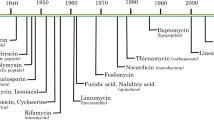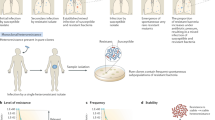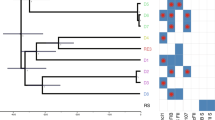Abstract
INFECTIOUS drug resistance that can be transferred in vitro from a donor bacterium to a sensitive recipient bacterium can also be transferred in vivo. Transfer has been shown to occur in mice which have had their normal intestinal flora reduced by the preliminary feeding of antibiotics. In such mice the donor and recipient strains become well established and multiply in the intestine1,2.
This is a preview of subscription content, access via your institution
Access options
Subscribe to this journal
Receive 51 print issues and online access
$199.00 per year
only $3.90 per issue
Buy this article
- Purchase on Springer Link
- Instant access to full article PDF
Prices may be subject to local taxes which are calculated during checkout
Similar content being viewed by others
References
Kasuya, M., J. Bacteriol., 88, 322 (1964).
Guinée, P. A. M., Antonie v. Leeuwenhoek, 31, 314 (1965).
Smith, H. W., and Halls, S., Brit. Med. J., i, 266 (1966).
Author information
Authors and Affiliations
Rights and permissions
About this article
Cite this article
WALTON, J. In vivo Transfer of Infectious Drug Resistance. Nature 211, 312–313 (1966). https://doi.org/10.1038/211312a0
Issue Date:
DOI: https://doi.org/10.1038/211312a0
This article is cited by
Comments
By submitting a comment you agree to abide by our Terms and Community Guidelines. If you find something abusive or that does not comply with our terms or guidelines please flag it as inappropriate.



